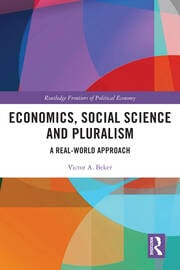One of the purposes – if not the main one – of mimicking physics was to argue that economics is a value-free science as it is argued about the natural sciences. However, the truth is that every researcher starts her work expecting to arrive at some result. The critical issue is if, in the process of investigation, she is open to consider arriving at a different conclusion although it may contradict her own and her colleagues’ a priori beliefs. Any individual or social group has a certain set of beliefs and values, a certain weltanschauungen, which permeates their ideas and attitudes. Although they seem quite natural for them, they are prejudices in the sense that they are opinions or feelings formed beforehand without a scientific knowledge to support them. As Irene van Staveren
Topics:
Editor considers the following as important: Uncategorized
This could be interesting, too:
tom writes The Ukraine war and Europe’s deepening march of folly
Stavros Mavroudeas writes CfP of Marxist Macroeconomic Modelling workgroup – 18th WAPE Forum, Istanbul August 6-8, 2025
Lars Pålsson Syll writes The pretence-of-knowledge syndrome
Dean Baker writes Crypto and Donald Trump’s strategic baseball card reserve
One of the purposes – if not the main one – of mimicking physics was to argue that economics is a value-free science as it is argued about the natural sciences.
However, the truth is that every researcher starts her work expecting to arrive at some result. The critical issue is if, in the process of investigation, she is open to consider arriving at a different conclusion although it may contradict her own and her colleagues’ a priori beliefs.
Any individual or social group has a certain set of beliefs and values, a certain weltanschauungen, which permeates their ideas and attitudes. Although they seem quite natural for them, they are prejudices in the sense that they are opinions or feelings formed beforehand without a scientific knowledge to support them.
As Irene van Staveren (2020: 108) points out, “economists are just like people. They try to hold on to their worldview and put in much effort to protect their vested interests as academics, policy advisors, and teachers based on the skills they have acquired and invested in.”
Every scholar in social sciences chooses certain questions and expects certain results from her research according to her weltanschauungen.
Scientists are human beings and, as such, they are not exempt from confirmation bias, that is the propensity to stop gathering information when the evidence gathered so far confirms the views or prejudices one would like to be true while ignoring information that casts doubt on them. This particularly happens when the issues at stake have to do with the ideological community’s worldview, as it usually happens in social sciences.
As this is inevitable, the key issue is to be self-conscious of this to be sure that any conclusion arrived at is strictly the result of logical reasoning or of empirical testing rather than of conformity with what was a priori expected.
In social sciences there is not such a thing as scientific neutrality. It may exist to a certain extent in natural sciences. The recent experience of the role played by ideology in the initial medical opinions on how to fight the COVID-19 pandemic illustrate how it can also be a determinant factor even in medicine. It also showed how ideology fills any knowledge gap that exists in every discipline. In case of doubt on anything where science does not have a precise answer, people resort to ideology.
This does not mean that science is only ideology. The coincidence between the author’s affiliation and the conclusions emanating from her work does not in itself prove anything against her analytic work. In any case, the researcher has to prove that any statement she makes is not just the result of her ideological bias but the result of the use of a scientific method.
For this purpose, the social scientist has to be the devil’s advocate when discussing any hypothesis she proposes. “One has consistently to think against oneself – to make matters as difficult for oneself as one can” (Elster 2015: 13). But science cannot just rely on personal intellectual integrity. For this reason, the scientific community has designed methods and practices that structure and guide the scientific research such as the rules that govern the process of hiring and promoting scientists, the peer review process for scientific publications, and so on.
However, these mechanisms are double-edged. In the case of economics, for example, Heckman and Moktan (2020) underline that a centralized power in the hands of a small group of editors and reliance on the so-called Top Five (T5) journals of economics that certify quality, incentivizes professional incest, and raises entry costs for new ideas and persons outside the orbits of the journals and their editors. As the authors remind, “decisions about promotions, recognitions, and even salaries are tied to publication counts in the T5” (Heckman and Moktan 2020: 420). If you want to publish a paper in one of the T5s journals – and PhD students badly need to – you will write something within the perimeter of mainstream economics. “For many young economists, if a paper on any topic cannot be published in a T5 outlet, the topic is not worth pursuing” (ibid.: 420).

